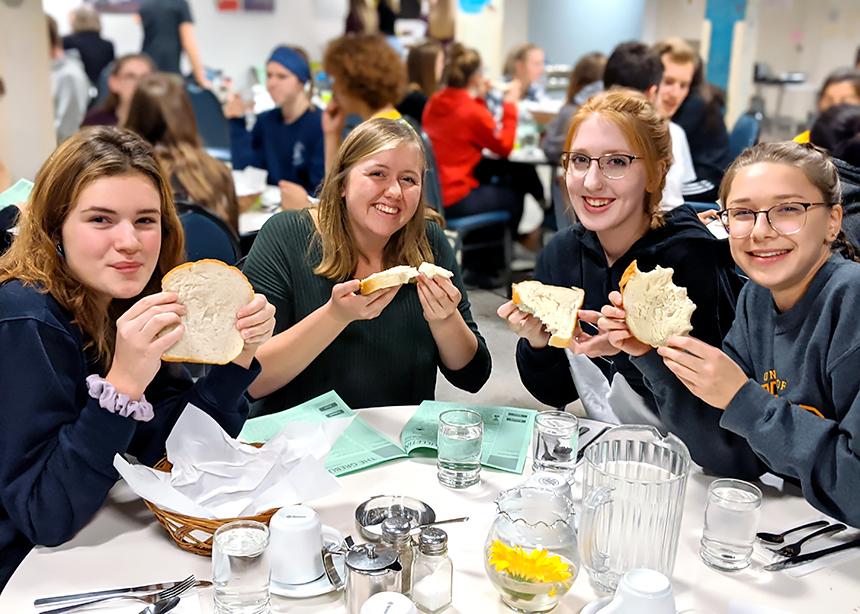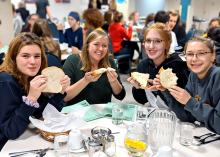Every Wednesday at 5:30 p.m., students, staff and faculty at Conrad Grebel University College in Waterloo, Ont., gather to share a meal called Community Supper.
This tradition traces back to the mid-1960s, when the college was founded, and to Grebel’s very first president, J. Winfield Fretz. In those early days, he insisted on having small round tables in the dining room that sat six people, because “round tables,” he explained, “rather than square tables, allow all people, whether it is two, three, four, five or six, to face each other directly.” He understood the importance of inclusive conversation in the building of community, and so he introduced Community Supper as a means of community building.
Another tradition that began nearly 20 years after Fretz initiated Community Supper was the act of breaking bread together. In the early 1980s, Community Supper bread was added to the weekly meal, becoming a treasured tradition. The bread is made in the Grebel kitchen every Wednesday morning, and as its scent wafts out of the kitchen and into the dining room, it builds anticipation for the meal and fellowship that will happen later that day.
“I like to think of Community Supper as Grebel’s ‘Sunday Morning,’ ” says Grebel’s current president, Marcus Shantz. “It’s a time when the entire community gathers to hear speakers, share announcements, have good conversation and enjoy a delicious meal.”
The delicious meal includes Community Supper bread, of course, and announcements are made to spread the word about upcoming opportunities and events. Speakers vary widely from week to week, and include professors from Grebel and the University of Waterloo, local and global activists, musicians and remarkable alumni. The carefully cultivated diversity of speakers ensures that students, staff and faculty hear from a wide variety of people throughout the year.
Good conversation is guaranteed at Community Suppers. The combination of students, staff and faculty from a broad range of areas of study and expertise, as well as cultural and religious backgrounds, promises lively discussions around each table.
The importance of this time together has inspired Grebel’s latest renovation project—a kitchen and dining room expansion. Currently, associate students, staff and faculty must be put on a wait list for Community Suppers due to limited space in the dining room. The expanded dining room will seat up to 300 people—a large improvement from the current capacity.
This construction project will allow Grebelites to continue the school’s “fill the table” tradition. Filling the table—filling all of the seats at one table before starting to fill a new table—creates the school’s hallmark inclusive and welcoming environment. The expansion project has been named after this tradition: “Fill the table: Making space for community.”
The smell of freshly baked bread may be what excites Grebelites for Community Supper every Wednesday, but it is the welcoming, caring community that sparks inspiring conversations and enduring connections once supper starts.
Find the authentic recipe for Community Supper bread at canadianmennonite.org/community-supper-bread.
Read more Gathering Around the Table stories:
Christmas Eve tradition brings comfort and joy
Hostess enjoys surprising her guests
Vegan Mennos
Everyone loves Wacky cake
'To the heart through dal'




Add new comment
Canadian Mennonite invites comments and encourages constructive discussion about our content. Actual full names (first and last) are required. Comments are moderated and may be edited. They will not appear online until approved and will be posted during business hours. Some comments may be reproduced in print.